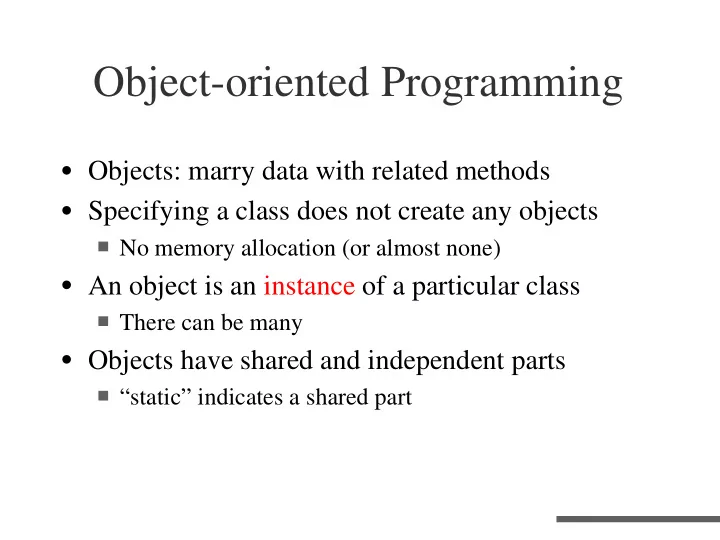

Object-oriented Programming • Objects: marry data with related methods • Specifying a class does not create any objects No memory allocation (or almost none) • An object is an instance of a particular class There can be many • Objects have shared and independent parts “static” indicates a shared part
Class Person public class Person { private String name=""; // no public variable public Person(String n) { // "constructor" name=n; } public String getName() { // Accessor method return name; } public String toString() { // used to get a string representation return "name="+name; } } What does this class do??
Objects • All Java objects extend Object (unless otherwise specified) • An object is referred to by a reference variable Pers rson n p = = ne new P Pers rson( n(“Ja Jane” e”); p name: “Jane” address getName() toString()
Comparison and Use public class PU { public static void main(String[] args) { Person p1 = new Person("Jane"); Person p2 = new Person("Dick"); Person p3 = new Person("Jane"); Person p4 = p1; System.out.println("See " + p1 + " run. See " + p2 + " run"); System.out.println(p1==p2); Danger here!!! System.out.println(p1==p3); System.out.println(p1==p4); System.out.println(p1.getName()==p3.getName()); System.out.println(p1.getName().equals(p3.getName())); } } A method of the class String Output?
The equals() method public boolean equals (Person p) { return name.equals(p.getName()); } if (p1.equals(p2)) • Comparison of any objects should be done through implementing the equals() method
The th this keyword • Refers to the object through which the method is invoked public class Person2 { private String name=""; public Person2(String n) {name=n; } public String getName() {return name;} public String toString() {return "name="+name;} private Person2 spouse=null; public void marry(Person2 p) { spouse=p; p.marry(this); } }
Example: marriage public class PU2 { public static void main(String[] args) { Person2 p1 = new Person2("Jane"); Person2 p2 = new Person2("Dick"); p1.marry(p2); } What does this do?
null ll • null is a special word; it signifies no reference • Must check for null ll , otherwise may cause nullPointerException // Person3 is as person2 but with some changes/additions public String toString() { if (spouse==null) return "name="+name+ ” --single"; else return "name="+name + " --married to " + spouse.getName(); } private Person3 spouse=null; public void marry(Person3 p) { if (spouse != null) { spouse=p; p.marry(this); } }
finally: divorce Create a new class Person4 that is the same a Person3 but has a divorce method public class Person4 { .... public void divorce( ) { if (spouse != null) { spouse.divorce(); spouse=null; } }
The keyword st stati tic • Non-static vars/methods bind to the current object, • static methods or variables belong to the entire class, and are shared • Calls to stat atic methods outside of class must prefix with classname • Static methods and variables are almost always public • Cannot use non-static methods and variables from a static method • Almost always should only use static variables as constants
Static Variables -- example public class StU public class St { { public static void main(String[] args) public static int si; { private int ci; St s1 = new St(5); public St(int i) St s2 = new St(6); { System.out.println(s1+" " + s2); ci=i; s1.si=7; } System.out.println(s1+" " + s2); public String toString() s2.si=8; { System.out.println(s1+" " + s2); return si+"<>"+ci; St.si=9; } System.out.println(s1+" " + s2); } } } Output of St, Stu?
Recommend
More recommend